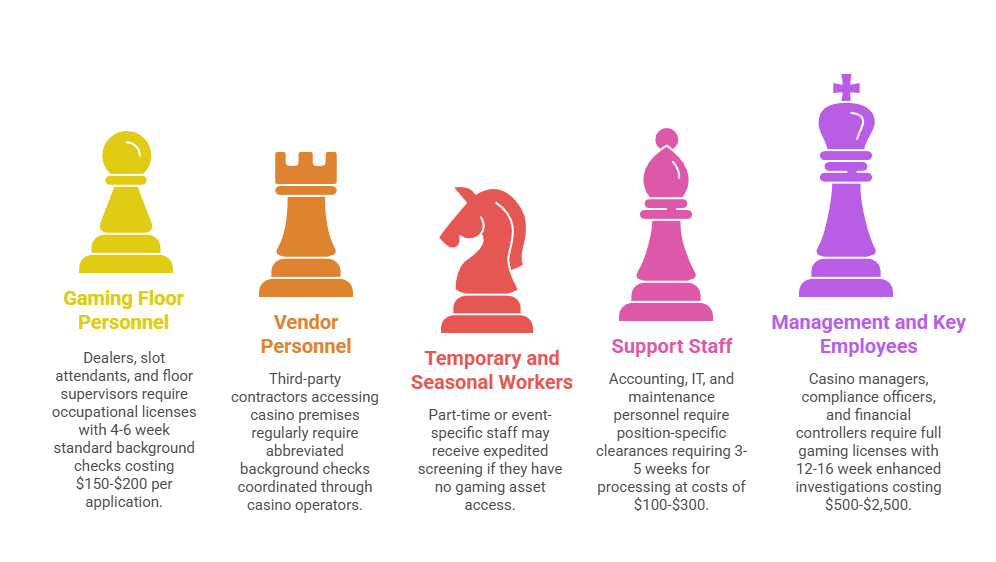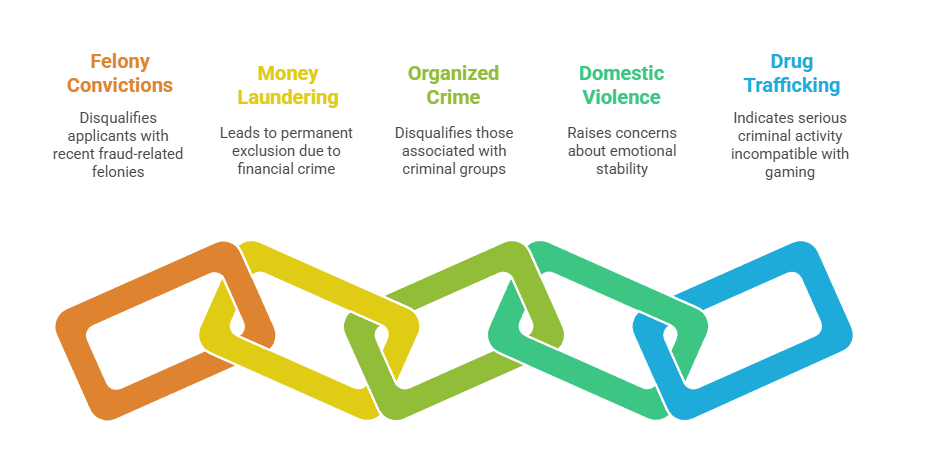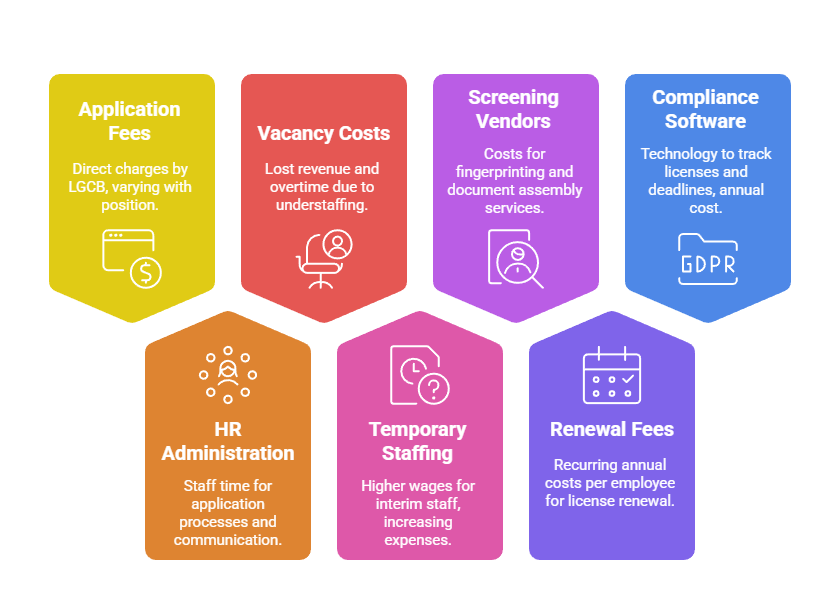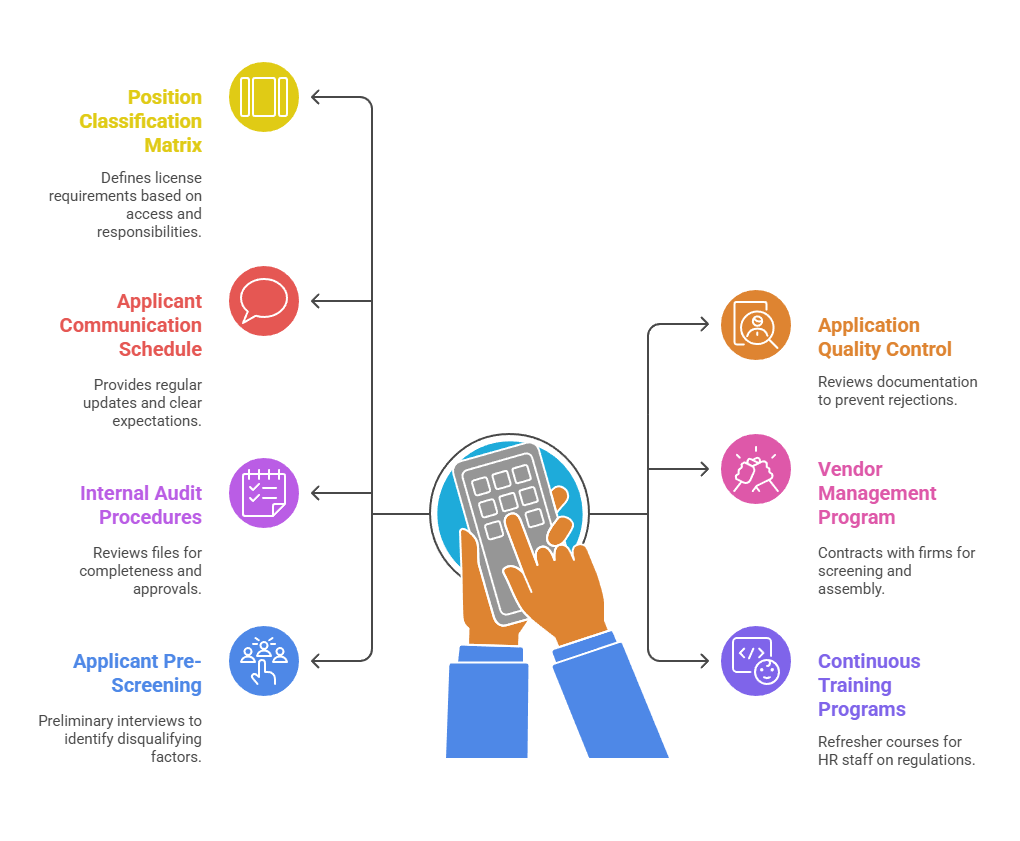Louisiana's casino background check requirements are among the most stringent in the gaming industry. The Louisiana Gaming Control Board (LGCB) mandates these protocols to ensure regulatory compliance and public trust. Casino operators must navigate complex federal and state regulations. These include multi-jurisdictional criminal history checks, financial verifications, and continuous monitoring programs.
Key Takeaways
- Louisiana requires all casino employees to undergo comprehensive background checks through the Louisiana Gaming Control Board before starting work.
- The screening process includes FBI fingerprint-based criminal history checks, credit reports, ten-year employment verification, and gaming license history reviews.
- Processing times typically range from 4-8 weeks for standard positions and 12-16 weeks for key employees and gaming license holders.
- Disqualifying factors include felony convictions within ten years, gaming-related offenses, significant financial issues, and failure to disclose previous employment.
- Louisiana riverboat casino employment screening costs range from $150-$500 per applicant, with casinos bearing the financial burden plus annual renewal fees.
- The Louisiana Gaming Control Board maintains ongoing monitoring authority, requiring 48-hour arrest reporting and random re-screening throughout employment.
- Tribal gaming facilities follow parallel requirements under the Indian Gaming Regulatory Act (IGRA) while coordinating with state authorities.
- Compliance failures result in penalties from $10,000-$100,000 per violation, license suspensions, or potential operating authority revocation.
Understanding Louisiana's Casino Regulatory Framework
The Louisiana Gaming Control Board's Authority
The Louisiana Gaming Control Board oversees all commercial gaming operations within the state. Established under Louisiana Revised Statutes Title 27, the LGCB maintains comprehensive jurisdiction over licensing and compliance. The Board also controls background investigation protocols for casino employees. Louisiana centralizes these functions to ensure consistent screening standards.
The LGCB's investigative division employs specialized agents. These professionals are trained in financial crimes, organized crime detection, and gaming integrity enforcement. They conduct thorough background investigations that extend beyond automated database checks. Their work includes interviews with former employers and financial institution inquiries. Agents also coordinate with law enforcement agencies across multiple jurisdictions.
The Board's authority covers both licensing decisions and ongoing compliance enforcement. LGCB investigators may conduct unannounced site visits to casinos. They review surveillance footage, interview employees, and examine financial records. This oversight ensures gaming operations maintain the highest integrity standards.
Statutory Requirements Under Louisiana Law
Louisiana Revised Statutes §27 and §27 establish foundational requirements for casino employee background checks. These statutes mandate that no person may work in gaming operations without prior Gaming Control Board approval. The law defines "gaming employee" broadly. This includes dealers, pit supervisors, cashiers, surveillance personnel, and security staff.
Casino operators must submit detailed applications for prospective employees. Applications include personal history forms spanning a minimum of ten years. Documentation must include residential addresses, employment history, financial information, and criminal records. The Gaming Control Board can extend investigations beyond the standard ten-year window. This occurs particularly for executive positions or individuals with prior gaming industry involvement.
The statutory framework also establishes penalties for non-compliance. These include fines, license suspensions, and potential criminal charges. Casino operators who employ unlicensed individuals face serious regulatory consequences. These strict enforcement mechanisms ensure all gaming facilities adhere to Louisiana's background check requirements.
Types of Gaming Licenses in Louisiana
Louisiana issues several categories of gaming credentials based on position type and responsibilities. Understanding these distinctions helps casino operators budget appropriately and set realistic timelines. The LGCB categorizes licenses into occupational permits, key employee licenses, and vendor clearances.
Occupational permits cover most gaming floor positions. These include dealers, slot attendants, and floor supervisors. Key employee licenses apply to management positions with significant operational authority. Vendor clearances address third-party contractors who regularly access casino premises.
Louisiana Casino Background Check Requirements by Position Level
Casino employee screening follows a tiered approach based on position responsibilities. Different roles trigger varying scrutiny levels from the Louisiana Gaming Control Board. Understanding these distinctions helps operators budget and plan hiring timelines.
The LGCB categorizes positions into three primary tiers. Each tier involves distinct application processes, investigation depths, and approval timelines:

- Gaming Floor Personnel: Dealers, slot attendants, and floor supervisors requiring occupational licenses with 4-6 week standard background checks costing $150-$200 per application.
- Management and Key Employees: Casino managers, compliance officers, and financial controllers requiring full gaming licenses with 12-16 week enhanced investigations costing $500-$2,500.
- Support Staff: Accounting, IT, and maintenance personnel with position-specific clearances requiring 3-5 weeks for processing at costs of $100-$300.
- Vendor Personnel: Third-party contractors accessing casino premises regularly, requiring abbreviated background checks coordinated through casino operators.
- Temporary and Seasonal Workers: Part-time or event-specific staff who may receive expedited screening if they have no gaming asset access.
Casino operators must accurately classify each position. Misclassification can result in regulatory violations and potential fines. HR departments should consult with LGCB representatives when uncertainty exists.
Gaming Floor Personnel and Dealers
Casino dealer background check requirements involve multi-tiered screening. This varies by the employee's access to gaming assets and customer interactions. Table games dealers, slot technicians, and floor supervisors must obtain occupational licenses. The LGCB issues these after comprehensive background investigations.
The process begins with fingerprint capture using FBI-approved Live Scan technology. This searches national criminal databases including NCIC and state repositories. Beyond criminal history, dealer applicants face scrutiny of their gaming employment history. The LGCB contacts previous gaming employers to verify service dates and job responsibilities.
The occupational license application requires detailed personal disclosures. These include all addresses for the past ten years and family member information. Dealers must list any professional licenses held in other states. The LGCB reviews this information carefully, cross-referencing statements against public records.
Management Positions and Executive Screening
Executive-level positions face the most rigorous screening under Louisiana Gaming Control Board protocols. These "key employees" must obtain full gaming licenses rather than occupational permits. This triggers enhanced due diligence requirements comparable to principal ownership vetting.
The LGCB examines business associations and family relationships to known criminals. Investigators review detailed financial records including tax returns for five years. Key employee investigations typically require 12-16 weeks. The Gaming Control Board may conduct field investigations, interviewing neighbors and business associates.
Financial disclosure requirements for key employees include documentation of all income sources. The LGCB analyzes these records to identify potential conflicts of interest. Applicants must explain any significant financial transactions within five years. This includes large deposits, real estate purchases, or business investments.
Support Staff and Restricted Access Positions
Support staff positions without direct gaming involvement still require background checks. This applies when employees have access to restricted areas or sensitive information. Accounting personnel who handle gaming revenue need screening. IT staff with system access and maintenance workers entering secured areas require modified screening.
The LGCB provides tiered clearance categories. These allow casino operators to match screening intensity to actual risk levels. Lower-tier clearances may require only criminal history checks and basic employment verification. Higher tiers include financial reviews and more extensive background investigations.
Casino operators must carefully document access levels for all support positions. Employees cannot exceed their authorized areas. Security systems should track employee movements through restricted zones. Regular audits help verify that employees maintain appropriate clearance levels.
The Louisiana Riverboat Casino Employment Screening Process
Application and Documentation Requirements
The Louisiana riverboat casino employment screening process begins with Gaming Control Board applications. Casino operators submit these on behalf of prospective employees. The Personal History Disclosure Form (PHDF) serves as the foundation document. It requires detailed information across multiple categories.
Documentation requirements include government-issued photo identification and Social Security cards. Applicants need birth certificates or naturalization papers. Professional licenses relevant to the gaming position are also required. For applicants who lived or worked outside Louisiana, additional clearances may be necessary.
Applicants must provide notarized authorizations. These allow the Gaming Control Board to access sealed records and contact previous employers. The authorizations also permit credit report reviews and law enforcement information access. Applicants who refuse to sign complete authorizations will have their applications denied.
Investigation Timeline and Processing Stages
Standard casino employee background checks progress through several distinct stages. Each has specific timelines and potential delay points. Initial processing includes application review for completeness. This phase also covers fingerprint submission to the FBI.
| Processing Stage | Standard Positions | Key Employee Positions |
| Application Review | 3-5 business days | 5-10 business days |
| FBI Fingerprint Check | 1-2 weeks | 1-2 weeks |
| Employment Verification | 2-3 weeks | 4-6 weeks |
| Financial Review | 1 week | 3-4 weeks |
| Field Investigation | Not Required | 4-6 weeks |
| Final Review & Approval | 1 week | 2-3 weeks |
The preliminary phase typically requires 2-3 weeks for basic positions. It may extend longer during periods of high application volume. The investigation phase follows, during which LGCB agents contact former employers. Casino operators should factor these timelines into hiring schedules.
Conditional Employment Options
Louisiana regulations permit conditional employment under limited circumstances. Casino operators may request temporary clearances for applicants who completed initial criminal history checks. These temporary authorizations typically last 90 days. They come with restrictions on access to certain gaming functions.
Temporary clearances serve operational needs during staffing shortages. However, they create risks for casino operators. If the completed investigation reveals disqualifying information, the casino must immediately terminate employment. Compliance officers must implement enhanced monitoring protocols for conditionally employed staff.
The Gaming Control Board reviews temporary clearance requests carefully. The Board may deny conditional employment for positions with significant responsibilities. Casinos should not rely on temporary clearances as standard practice. Reserve them for exceptional circumstances when operational needs justify the additional compliance burden.
Common Application Mistakes to Avoid
Many background check applications experience delays due to preventable errors. Incomplete documentation represents the most common issue. Missing signatures, outdated addresses, or unsigned authorization forms trigger application rejections. These errors require resubmission and restart processing timelines.
Another frequent mistake involves insufficient employment history details. Applicants must account for all time periods within the ten-year window. Unexplained gaps raise red flags for investigators. Providing thorough explanations upfront prevents delays from investigator follow-up requests.
Inaccurate or inconsistent information also causes problems. Discrepancies between application statements and official records trigger additional scrutiny. Applicants should review all forms carefully before submission. Honesty about past issues typically receives better consideration than attempts to conceal information.
Disqualifying Factors and Criminal History Considerations
Automatic Disqualifications
Louisiana maintains specific categories of criminal convictions that create automatic disqualifications. These apply regardless of time elapsed or rehabilitation evidence. Understanding these permanent barriers helps both casino operators and job seekers. The Gaming Control Board enforces these standards uniformly across all commercial gaming operations.
Gaming-related offenses result in permanent exclusion from Louisiana gaming operations. These include cheating, card manipulation, slot machine tampering, and casino theft. The following categories also create automatic disqualifications:

- Felony Convictions: Any felony within ten years involving fraud, embezzlement, theft, or crimes of moral turpitude disqualifies applicants without waiver possibility.
- Money Laundering: Convictions or credible evidence of money laundering activities creates permanent exclusion from gaming employment.
- Organized Crime: Demonstrated associations with organized crime figures or enterprises disqualifies applicants from all gaming positions.
- Domestic Violence: Recent domestic violence convictions raise concerns about emotional stability and judgment under pressure.
- Drug Trafficking: Convictions for manufacturing, distributing, or trafficking controlled substances indicate serious criminal activity incompatible with gaming employment.
The LGCB also considers pattern behaviors suggesting unsuitability for gaming employment. Multiple misdemeanor convictions may indicate poor judgment. Repeated traffic violations or license suspensions can raise concerns about responsibility.
Case-by-Case Evaluations
For criminal history outside automatic disqualification categories, the Louisiana Gaming Control Board conducts individualized assessments. Multiple factors influence these decisions. The nature and severity of the offense matter significantly. Time elapsed since conviction also plays a role.
The LGCB considers mitigating factors. These include successful probation completion and participation in rehabilitation programs. Character references from law enforcement or community leaders help. Absence of subsequent criminal activity strengthens applications. Applicants may submit letters explaining circumstances surrounding past convictions.
Documentation supporting rehabilitation claims strengthens applications considerably. Completion certificates from substance abuse programs help demonstrate reform. Letters from probation officers confirming successful supervision provide valuable evidence. Employment records showing stability and community service documentation all support rehabilitation claims.
Financial History Screening
Financial background checks constitute a critical component of casino employment screening. The LGCB reviews credit reports for patterns suggesting financial distress. This includes bankruptcies, significant unpaid debts, tax liens, and judgments. Poor credit alone doesn't disqualify applicants. However, it raises concerns about susceptibility to theft or collusion.
Recent bankruptcies within two years receive heightened scrutiny. This applies particularly for positions involving cash handling or revenue access. The Gaming Control Board may request detailed explanations for financial problems. Medical bankruptcies typically receive more favorable consideration than debt from gambling.
The LGCB also examines patterns of credit misuse. These include defaults on multiple accounts and repeated late payments. Maxed-out credit cards suggest poor financial management skills. Applicants demonstrating financial recovery may overcome initial credit concerns. Evidence includes debt repayment plans, credit counseling participation, and improved money management.
Compliance Costs and Implementation Challenges
Louisiana casino background check requirements impose significant financial burdens on gaming operators. Casino operators must account for both immediate costs and long-term expenses. These extend beyond simple application fees to operational inefficiencies and administrative overhead.
Standard occupational license applications cost $150-$300 per applicant. Key employee investigations range from $500-$2,500 based on investigation scope. Understanding the full cost structure helps operators develop accurate hiring budgets:

- Direct Application Fees: LGCB charges ranging from $150-$2,500 per applicant based on position classification and investigation scope.
- Internal HR Administration: Staff time for application preparation, document collection, LGCB coordination, and applicant communication.
- Extended Vacancy Costs: Lost revenue from understaffed gaming floors, overtime for existing employees, and reduced operational efficiency.
- Temporary Staffing Solutions: Premium wages or agency fees for interim staff, often commanding 20-30% premiums over regular wages.
- Background Screening Vendors: Professional services managing fingerprinting and document assembly, typically adding $50-$150 per applicant.
- Annual Renewal Fees: Recurring costs of $50-$500 per employee depending on license type.
- Compliance Software Systems: Technology platforms tracking license expirations and renewal deadlines, costing $10,000-$50,000 annually for mid-sized operations.
For a mid-sized riverboat casino processing 200 new hires annually, total costs easily exceed $100,000. This accounts for all direct and indirect expenses. Casino operators in competitive labor markets may lose qualified applicants to faster-hiring industries.
Operational Impact on Hiring Timelines
Extended timelines create significant operational challenges for casino HR departments. Unlike typical employment screening completed within 3-5 business days, gaming checks extend hiring cycles by 4-16 weeks. This delay complicates workforce planning. It particularly affects seasonal staffing increases or new gaming floor openings.
Casino operators must maintain robust applicant pipelines. This ensures continuous candidate flow through the background check process. Sophisticated applicant tracking systems are required. These monitor each candidate's investigation status and trigger follow-up communications.
Extended timelines also affect workforce flexibility during peak periods. Casinos cannot quickly scale up staffing for major events or holiday periods. New employees need months of lead time. This forces operators to rely on overtime from existing staff or operate short-handed.
Strategic Workforce Planning
Successful casino operators implement strategic workforce planning. This anticipates background check delays and maintains continuous recruitment activities. Rather than hiring reactively to fill immediate vacancies, these casinos maintain ongoing candidate relationships. They process background checks proactively.
HR departments should track historical turnover patterns. This helps predict future hiring needs and begin recruitment efforts months in advance. Seasonal operations particularly benefit from this approach. Begin background check processing during slow periods. This ensures new employees receive approval before peak season arrives.
Ongoing Monitoring and Renewal Requirements
Continuous Screening Obligations
Louisiana casino security clearance background check requirements don't end with initial employment approval. The Gaming Control Board mandates ongoing monitoring throughout an employee's gaming career. Casino operators must report any employee arrests to the LGCB within 48 hours. This applies regardless of whether charges relate to job performance.
The LGCB maintains authority to conduct random re-investigations of licensed employees. These occur without cause. Investigations potentially examine updated criminal history, financial records, or new associations. Casino operators must cooperate fully with these inquiries. This includes providing personnel file access, surveillance footage, and employee interviews.
Ongoing monitoring also includes surveillance of employees during work hours. This detects signs of theft, collusion, or other integrity violations. Casino security departments coordinate with compliance officers. They investigate suspicious activities and report findings to the Gaming Control Board when necessary.
License Renewal Processes
Gaming licenses and occupational permits require periodic renewal. This typically occurs on annual or biennial cycles depending on position classification. Renewal applications involve abbreviated background checks. These focus on criminal activity, financial changes, or disciplinary actions since initial licensing.
Casino operators must implement tracking systems. These ensure timely renewal submissions for all licensed employees. Operating with expired credentials violates Gaming Control Board regulations. HR departments typically begin renewal processes 90 days before expiration dates. This accommodates potential processing delays.
Renewal applications provide opportunities for the Gaming Control Board to reassess employee suitability. Employees with disciplinary actions or customer complaints may face enhanced scrutiny. Casino operators should address performance problems promptly. Patterns of misconduct can jeopardize license renewals.
Reporting Changes in Personal Circumstances
Licensed gaming employees must proactively report significant life changes. These could affect their suitability for continued employment. Reportable events include criminal arrests or convictions. Changes in financial status such as bankruptcy filings also require reporting.
This ongoing disclosure obligation creates challenges for employees. Many may not understand the breadth of reportable circumstances. Casino operators must provide clear guidance about reporting requirements. Establish confidential channels for disclosures. Compliance departments should maintain regular communication with all licensed employees.
The LGCB takes failure to report seriously. Penalties for non-disclosure are often harsher than for the underlying reportable event. Employees who promptly report arrests or financial problems typically receive more favorable consideration. This policy encourages transparency and reinforces the importance of ongoing honesty.
Best Practices for Casino HR Compliance

Developing Robust Screening Protocols
Casino HR directors should implement comprehensive internal screening policies. These must meet or exceed Louisiana Gaming Control Board standards. Written procedures ensure consistent application across all hiring managers. They also document the casino's good-faith compliance efforts.
Best-in-class casinos maintain detailed procedure manuals. These address every aspect of the background check process. Coverage extends from initial recruitment through ongoing monitoring. Effective compliance requires comprehensive training for all hiring managers, supervisors, and HR personnel.
Casino operators should establish the following compliance protocols:

- Position Classification Matrix: Clear documentation defining which positions require specific license types based on facility access and job responsibilities.
- Application Quality Control: Multi-step review processes catching incomplete documentation before LGCB submission to prevent costly rejections.
- Applicant Communication Schedule: Weekly status updates to candidates, proactive delay notifications, and clear timeline expectations set during job offers.
- Vendor Management Program: Contracts with professional background screening firms providing fingerprinting services and document assembly.
- Internal Audit Procedures: Quarterly reviews of background check files ensuring documentation completeness and proper approvals.
- Continuous Training Programs: Annual refresher courses for HR staff covering regulatory updates and internal procedure modifications.
- Applicant Pre-Screening: Preliminary interviews addressing potential disqualifying factors before investing time in formal LGCB applications.
These protocols reduce compliance risks while improving operational efficiency. Casino operators benefit from treating background checks as strategic workforce planning components.
Leveraging Technology for Compliance Management
Modern casino operators increasingly rely on specialized compliance software. These platforms manage background check workflows, track license renewals, and monitor ongoing screening requirements. Technology integrates with applicant tracking systems and electronic fingerprinting services. This provides real-time status updates.
Advanced compliance management systems generate automated alerts. These notify staff when license expiration dates approach. Alerts also trigger when employee arrest notifications are due. This proactive approach prevents lapses in compliance. The systems maintain comprehensive audit trails documenting all compliance activities.
Training and Communication Strategies
Effective compliance requires that all personnel understand Louisiana casino employment screening requirements. Training should cover legal requirements, internal procedures, and common application errors. Casino operators should conduct annual refresher training. Updates are necessary whenever Gaming Control Board regulations change.
Communication with applicants throughout the background check process demonstrates professionalism. It also reduces candidate dropout rates. HR departments should establish regular touchpoint protocols. Provide weekly or biweekly updates on investigation status. Proactively notify candidates of any delays.
Conclusion
Louisiana casino background check requirements reflect the state's commitment to gaming integrity. Casino operators must navigate complex regulations spanning criminal history checks and financial verifications. They also manage ongoing monitoring and coordination across jurisdictions. By implementing robust internal procedures and leveraging technology solutions, Louisiana casinos can achieve regulatory compliance. Success requires treating background checks as fundamental components of responsible gaming operations. These protect both the casino's reputation and Louisiana's gaming industry integrity.
Frequently Asked Questions
How long does a casino background check take in Louisiana?
Standard casino employee background checks typically take 4-6 weeks for gaming floor positions. Supervisory roles require 6-10 weeks. Key employee investigations requiring full gaming licenses can extend to 12-16 weeks. Processing times vary based on application completeness and the applicant's history complexity.
What disqualifies you from working at a casino in Louisiana?
Automatic disqualifications include felony convictions within ten years. Any gaming-related offenses regardless of timeframe also disqualify applicants. Crimes involving fraud or theft create permanent barriers. The Louisiana Gaming Control Board also considers patterns of criminal behavior and significant financial problems.
Do Louisiana casinos check credit history during background screening?
Yes, Louisiana casino background check requirements include credit report reviews. This applies to all positions involving cash handling or gaming operations. The Gaming Control Board examines credit history for bankruptcies and unpaid debts. Recent bankruptcies or significant unpaid obligations raise concerns about theft susceptibility.
Can you work at a Louisiana casino with a felony conviction?
Louisiana Gaming Control Board regulations create automatic disqualifications for felony convictions within ten years. Exceptions may exist for non-violent offenses unrelated to gaming operations. Felonies older than ten years receive case-by-case evaluation. Gaming-related felonies typically result in permanent exclusion regardless of time elapsed.
Are Louisiana casino background checks renewable, and how often?
Yes, Louisiana gaming licenses require periodic renewal. This occurs on annual or biennial cycles depending on position classification. Renewal processes involve abbreviated background checks. These focus on criminal activity or financial changes since initial licensing. Casino employees must also report arrests within 48 hours.
What's the difference between tribal casino and Louisiana state casino background checks?
Tribal gaming facilities operate under federal Indian Gaming Regulatory Act requirements. These are administered by tribal gaming commissions. Commercial casinos follow Louisiana Gaming Control Board regulations. Both systems require FBI fingerprint checks and criminal history reviews. Louisiana has established cooperation agreements with tribal authorities for information sharing.
How much do casino background checks cost in Louisiana?
Louisiana Gaming Control Board application fees range from $150-$200 for standard gaming floor positions. Supervisory roles cost $250-$400. Key employee investigations range from $500-$2,500. These fees cover LGCB processing but don't include casino internal costs. Annual renewal costs range from $50-$500 depending on license type.
Can you start working at a Louisiana casino before your background check is complete?
Louisiana regulations permit limited conditional employment while background checks remain pending. This requires Gaming Control Board approval. Casinos may request temporary clearances lasting up to 90 days. These come with restrictions on access to certain gaming functions and require enhanced supervision.
What happens if you fail a Louisiana casino background check?
Applicants who fail background checks receive written notification from the Gaming Control Board. This explains the basis for denial. Applicants may request reconsideration by submitting additional evidence. Success rates are low without substantial new information. Casino operators cannot employ individuals whose applications have been denied.
Does Louisiana recognize casino background checks from other states?
Louisiana does not automatically recognize background checks or gaming licenses from other states. All new employees undergo complete LGCB investigations regardless of previous clearances. However, the Gaming Control Board may expedite processing for applicants with recent approvals from other jurisdictions. Casino operators should still plan for full Louisiana background check timelines.
Additional Resources
- Louisiana Gaming Control Board - Official Website
https://www.doa.la.gov/doa/ogc/ - Louisiana Revised Statutes Title 27 - Gaming Control Law
https://legis.la.gov/Legis/Laws_Toc.aspx?folder=69&level=Parent - National Indian Gaming Commission - Background Investigations
https://www.nigc.gov/compliance/background-investigations - FBI Criminal Justice Information Services - Background Checks
https://www.fbi.gov/services/cjis - Fair Credit Reporting Act Compliance for Employers
https://www.ftc.gov/business-guidance/resources/using-consumer-reports-what-employers-need-know - Louisiana State Police - Criminal History Record Checks
https://www.lsp.org/services.html
